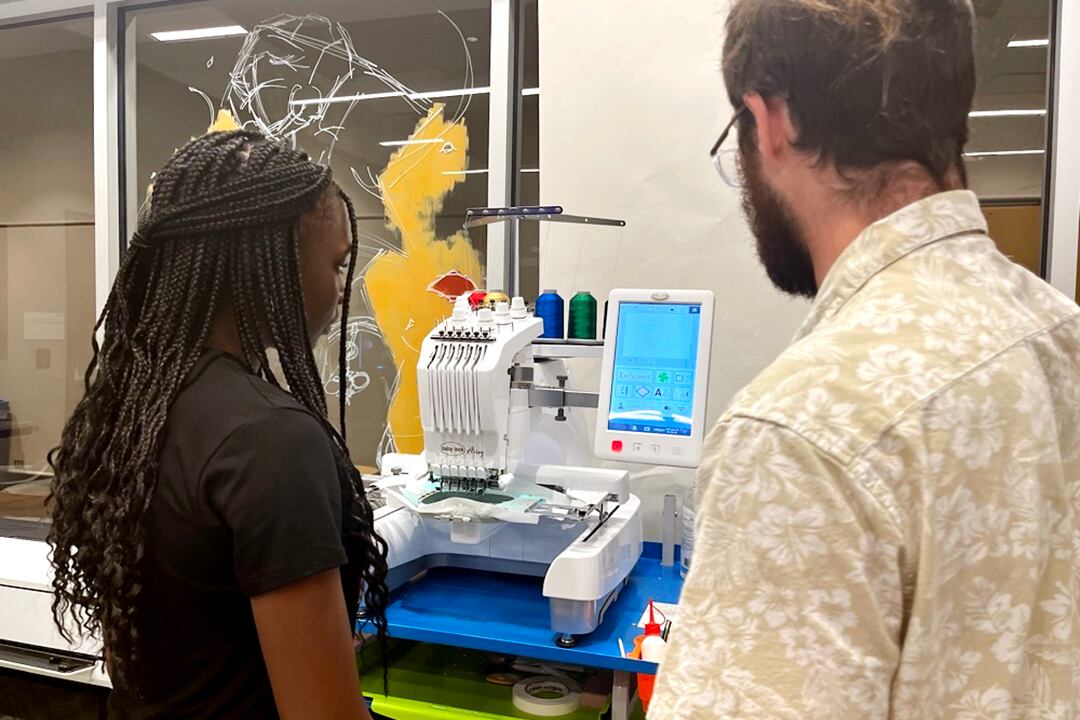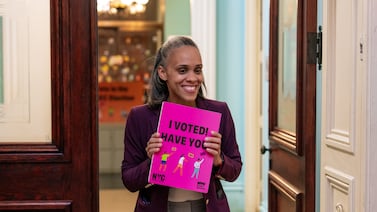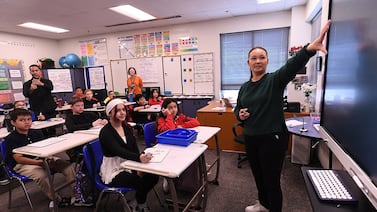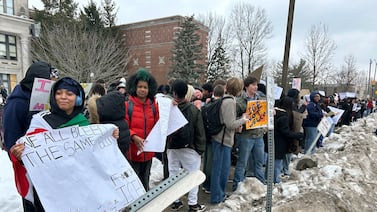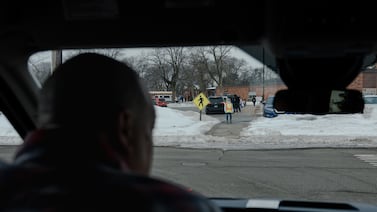Sign up for Chalkbeat Indiana’s free daily newsletter to keep up with Indianapolis Public Schools, Marion County’s township districts, and statewide education news.
When Adewale Adeboyejo asks his classmates what they want to do after college, he estimates that 80 to 90 percent give him the same answer: I don’t know.
Adeboyejo, a rising senior at Crispus Attucks High School in Indianapolis, used to be the same way.
“Before, I knew I wanted to go to college, but I didn’t know anything about college. I barely knew what majors were,” he said. “But now you can ask me my future plans and I can give you step-by-step what I really want to do after high school.”
What changed everything for Adeboyejo was Upward Bound, a program designed to help students prepare for college that falls under the umbrella of federal programs called TRIO. Adeboyejo entered the program last summer and, with guidance from advisers, crafted a plan to become a corporate lawyer by way of the National Guard and get undergraduate degrees in business administration and English.
Established in 1965, TRIO has helped millions of students access college. It provides services to support students from low-income backgrounds, first-generation college students, and students with disabilities as they pursue a college education. Programs include services such as mentoring, tutoring, financial literacy education, and research opportunities.
Every year, over 8,000 Indiana students take part in one of the 35 programs in the state. But after this year, they and other students nationwide may not get the chance to reap the benefits of programs like Upward Bound. Despite a record of bipartisan support, the Trump administration’s proposed budget for 2026 cuts all funding for the federal TRIO program, which received about $1.2 billion in federal funding this year.
In Trump’s budget proposal, the administration called TRIO “a relic of the past” and pushed responsibility for college recruitment and retention to colleges and universities.
The details of presidential budgets are often ignored by Congress when it approves annual spending. But advocates say gutting TRIO programs will hurt students who are already less likely to pursue higher education.
“I’m living proof that TRIO works,” said Ernest Evans, Director of Upward Bound at IU Indianapolis and an alumni of two TRIO programs, Upward Bound and Talent Search. “If it were not for TRIO, I wouldn’t have known what I could do for myself.”
TRIO gets students ‘to and through’ college
The TRIO umbrella includes eight programs, seven of which directly serve students — Educational Opportunity Centers, Ronald E. McNair Postbaccalaureate Achievement, Student Support Services, Talent Search, Upward Bound, Upward Bound Math-Science, and Veterans Upward Bound.
TRIO programs support a wide range of students, from middle schoolers to students pursuing their doctorate. At least two-thirds of students served are the first in their families to go to college or are from low-income backgrounds.
“Our goal is to get students to and through college,” said IU Indianapolis Upward Bound Assistant Director Shelene Baiyee.
At IU Indianapolis, Upward Bound is a full-year endeavor. During the school year, students take part in twice-a-week tutoring, as well as cultural dinners, major and career exploration, academic advising, life skills workshops, and college tours. In the summer, students live on the IU Indianapolis campus for six weeks, taking classes in English, math, Spanish, and science, as well as electives.
For Jayda Smith, a rising senior at Lawrence North High School who has been in the program for four years, Upward Bound boils down to one thing: the people.
“The staff, they’re very supportive. I feel like they’re more than just staff,” she said. “They’re people I can come to about my problems, like my concerns with school and my doubts in life.”
Smith feels much more prepared for college thanks to her time with Upward Bound.
“I’m more confident about what I want to do in life and how I’m going to go about doing it,” she said.
Trump administration says need for TRIO has declined
In its fiscal 2026 discretionary budget request, the Trump administration said that incentives are no longer needed to encourage institutions of higher learning to recruit low-income students.
“Today, the pendulum has swung and access to college is not the obstacle it was for students of limited means,” the request reads.
In fact, students from low-income backgrounds are still less likely to enroll in and complete college than their peers. According to The Pell Institute, in 2022, 79% of students in the highest income quartile attended a postsecondary institution, compared to just 44% from the lowest income quartile.
“I do think we still serve a group of students who would not have access to this information without this program,” said Evans. “Unfortunately our school systems cannot do everything, they cannot be there for everything. So there is a need for programs like ours, like TRIO, to come in and be able to provide that support.”
TRIO programs are not intended to serve as recruitment tools for particular universities. Rather, they introduce students to the college landscape, allowing them to see the realities and responsibilities of college life.
Trump’s discretionary budget request, however, seeks to shift the onus for recruitment and retention to universities. It accuses the TRIO program of “engaging in woke ideology with Federal taxpayer subsidies,” ostensibly because the program targets certain populations of disadvantaged students.
TRIO has long received support from lawmakers on both sides of the aisle.
On June 3, U.S. Sen. Susan Collins, a Maine Republican, criticized Trump’s proposed education budget, citing the lack of funding for TRIO.
“I have seen the lives of countless first-generation and low-income students, not only in Maine, but across the country, who often face barriers to accessing a college education, changed by the TRIO program,” she said.
The new fiscal year for the federal government starts Oct. 1, although congressional negotiations over annual spending frequently go past that deadline.
TRIO gives good return on investment, backers say
Over 10,000 program alumni recently signed a letter to lawmakers that cited data showing TRIO programs result in better college outcomes for participants. For example, the letter noted that Upward Bound students are more than twice as likely to earn a bachelor’s degree by age 24 than students in the lowest income quartile.
Advocates say the program not only helps individual students, but society as a whole.
“TRIO is not a handout,” said Letise Jenkins, president of Indiana TRIO. “TRIO is a return on investment.”
She believes graduation rates, college enrollment numbers, and college retention numbers for first-generation students and those from low-income backgrounds would drop with the loss of TRIO. Lower graduation rates could contribute to a less-skilled workforce and harm the economy.
Baiyee, the assistant director at IU Indianapolis Upward Bound, said the program can be life-changing.
“When you come from a household or background where you are the first person to navigate a territory such as the college landscape, you need support, you need experiences that open your eyes and remind you that you can make it,” she said.
She recalled a student who told her about how she and most of her classmates failed a test in one of their Upward Bound college-level Spanish classes.
The student’s professor warned the high schoolers that he had many college students who failed his class because they weren’t paying attention, distracted by their phones and other technology.
“So the lightbulb went off and she goes, ‘I really have to change some things,’” said Baiyee. “Those are the little moments that happen every single day during Summer Academy. There is not a single day that an epiphany does not go off for a student that either reminds them of what they can accomplish, challenges beliefs they’ve had, challenges them to be better than they were the day before.”
Corrections: June 26, 2025: A previous version of this story identified Shelene Baiyee as the academic coordinator of IU Indianapolis Upward Bound. Baiyee is the program’s assistant director. The story also previously identified a person in a photo about Upward Bound as Zack Schneider. His name is Zack Snyder. The story also previously said that there are seven programs under the TRIO umbrella. There are eight programs.
Samantha Camire is a summer reporting intern covering education in the Indianapolis area. Contact Samantha at scamire@chalkbeat.org.

